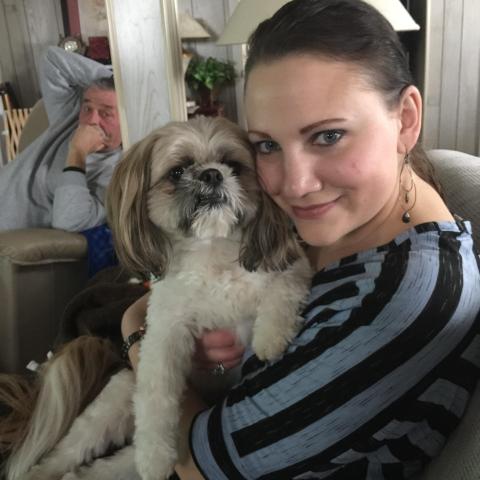
When Miranda’s cancer reoccurred for the second time, she and her husband Greg decided to expand their family — adopting the first of their two dogs, a Shih Tzu they named Tank (pictured here, with Miranda and her father Alan Hanson). Not long after, they adopted a second Shih Tzu, Ripley. “She really loved her dogs,” Greg said. “They don't judge you, they don't remind you of cancer, they don't remind you that you're really sick. They're just there for you.”
At age 24, Miranda Leah Hanson-Baseler, Ph.D., was diagnosed with stage III uterine sarcoma. Uterine sarcoma is distinct from endometrial cancer in both its location — it forms in the muscles of the uterus, rather than the tissue that lines it — and its rarity, accounting for less than 10% of uterine cancers.
Miranda, who passed away on May 1, 2023, was an exceptionally rare patient, persevering for 17 years. She is survived by her husband, Greg Baseler, parents Marsha and Alan Hanson, and brother Marshall Hanson.
When Miranda was diagnosed with uterine sarcoma in 2006, she was a graduate student in immunology at West Virginia University (WVU) in the lab of John B. Barnett. After being presented with her treatment options, Miranda underwent a hysterectomy followed by chemotherapy and radiation treatments.
Greg had previously met Miranda through his brother, who was a fellow immunology student with her at WVU. “We knew, unfortunately, that her specific cancer type, high-grade stage IIIC uterine sarcoma, was not a very good diagnosis, and there wasn't much literature on it,” Greg said.
When Miranda’s community at WVU hosted a chili cook-off as a fundraiser for her treatment, Greg came to support her.
“We really hit it off,” Greg said. “A year or two later, she was about to graduate, and she was doing well and in remission.” The two began dating and, eventually, they were married in 2014.
After Miranda completed her doctorate in immunology and microbial pathogenesis, she moved to Frederick, Maryland, for a postdoctoral fellowship in the lab of Scott K. Durum, Ph.D., Senior Investigator in the Cancer Innovation Laboratory. He recalls Miranda as a remarkable person with a great passion for science.
“When she interviewed, she told me she had been treated for uterine cancer and was in remission, but it could come back,” he said. Despite recurring bouts of her illness, she developed a novel therapeutic for inflammatory bowel disease during her time in Dr. Durum’s lab.
“It was inspiring to see her living and working harder and faster than any of us. Miranda was a leader in the community of postdocs. She was a joy to work with, and she had an extensive network of those whose lives she touched,” he adds.
In the intervening years, and those that followed, Miranda’s cancer returned; she would undergo periodic treatment at the Kelly Gynecologic Oncology Service at Johns Hopkins Medicine, under the supervision of Robert L. Giuntoli II, M.D. — now a professor of clinical obstetrics and gynecology at the University of Pennsylvania’s Perelman School of Medicine — and enroll in two clinical trials at the NCI in the Division of Cancer Treatment and Diagnosis.
According to Greg, who co-runs a small serology company based in Frederick with his brother, Miranda’s training in immunology gave her a sense of understanding and engagement in her treatments.
“She was always reviewing the literature and giving herself the best perspective she could,” Greg said. “And when she read something bad, she would just say, ‘Well, doesn't matter. That's not me.’ She wasn’t going to let a piece of paper tell her what she couldn’t do.”
While at CCR, Miranda began her transition to a career in science communications.
“She was a prolific writer and a prolific reader,” Greg said. “She got into science because she really enjoyed it. But I think she wanted to get away from the bench work.”
Following a brief stint as a content developer at Meso Scale Discovery beginning in 2014, Miranda began working as a technical and marketing writer at Qiagen in 2015, where she would spend the remainder of her career. There, she excelled, rising to Director of Marketing in 2019, and Senior Director of Marketing and Membership in the Science and Medicine group in 2022. She also led a global diversity inclusion program focused on women in the corporate workplace and mentored interns from Northwestern University’s Integrated Marketing Communications Program.
“One of the things you would hear most often about Miranda was how much she enjoyed helping people with their careers, especially women. She was striving so hard and working to elevate and really push the boundaries of what women could do in that sphere,” Greg said.
Miranda worked up to three days before she died. “Cancer was always part of our life, but that's a legacy that very few people get to experience,” said Greg. “You can't out-tough cancer, but her perseverance and her steadfast approach to life always shone through.”